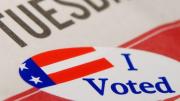Partisan loyalty is an important part of personal identity for many Americans, who hold on to their fidelity to true-blue Democrats or deep-red Republicans. A new Harvard Kennedy School (HKS) faculty working paper has found that, as a result, casting a ballot for a losing candidate can have effects that go far beyond intellectual disappointment with resulting policies. Voting, in fact, can be an emotional affair, significantly affecting short-term happiness and sadness.
“Losing Hurts: Partisan Happiness in the 2012 Presidential Election”—the new paper from HKS assistant professor of public policy Todd Rogers, Lamar Pierce of Washington University in St. Louis, and UCLA’s Jason Snyder—tracks the emotional responses of self-identified partisans in the weeks before and after the reelection of President Barack Obama. Using daily online survey data of general happiness from CivicScience, Inc., researchers found what they call an “asymmetric hedonic response.” Losing the election made Republican voters far sadder than winning the election made Democratic voters happier. “It turns out that being a partisan loser really hurts emotionally,” Rogers says. The resulting gloom from losing the election lasted for about a week.
To test just how much this loss hurts, the researchers compared the emotional impact of a lost election on strongly partisan voters to the toll that tragedies in the news can take on survey respondents who identify personally with national events. Thus they benchmarked their election results against the dip in happiness that parents felt after the murders at Sandy Hook Elementary School in Newtown, Connecticut, and that local residents felt after the 2013 Boston Marathon bombing. Pointing to what Rogers calls “the intense consequences of losing an election,” the political loss had about twice as strong an effect on personal happiness as these national tragedies did.
More research will be needed, he says, to see if this pattern continues in elections with candidates and political climates that differ from the 2012 race. In particular, elections like today’s midterms can be more complicated, as even the biggest partisan sweep of legislative races may not inspire the intense feeling that a presidential election result does. Rogers is also exploring how these emotional party affiliations play out in practice. Another recent working paper that he undertook with Berkeley’s Don A. Moore demonstrates that supporters are more likely to lend extra backing to candidates they believe are “just barely losing” than to those who are “just barely winning.” Emotions—pessimism and optimism, elation and defeat—are significant parts of American politics. “We know that partisanship shapes how we think, who we’re friends with, how we live, how we judge people,” Rogers says. “Given all those things, partisanship really shapes our identity and our well-being.”









